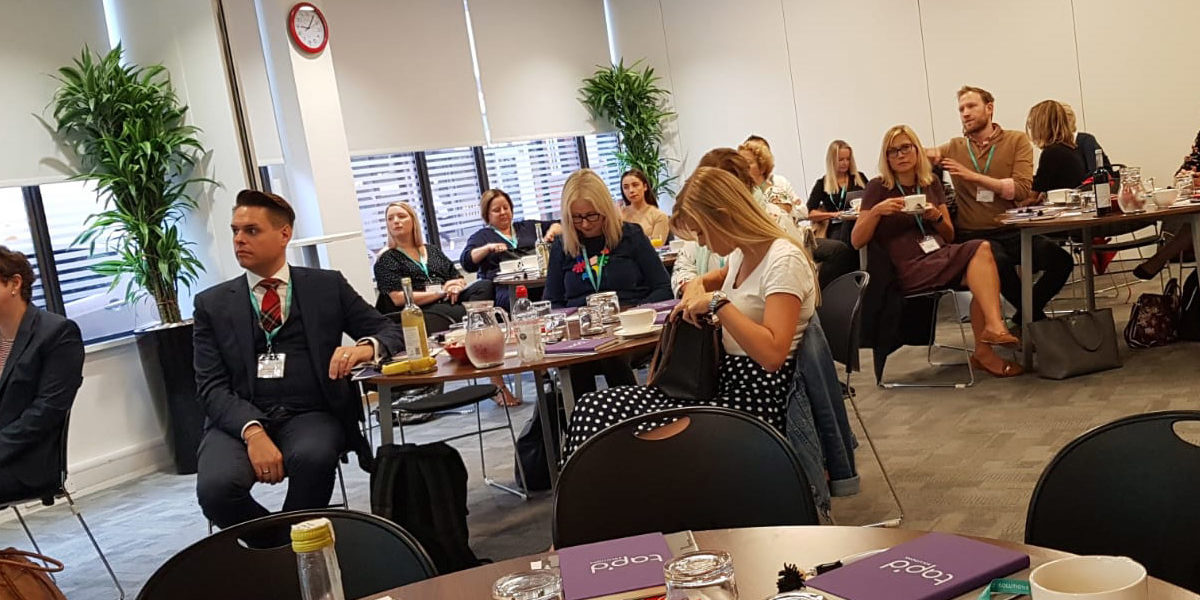Tuesday 17th September 2019 saw the Tap’d HR Forum return to London for the 8th time. This Forum again had great attendance from senior HR professionals across a range of sectors and disciplines. Our theme this time was “Engaging Your People to Create Great Organisations”.
We had an excellent and varied line up of speakers around this topic including myself and:
- Marc McKenna-Coles, Global Diversity & Inclusion Manager, Lloyds
- David Macdonald, Director of Learning, Arup
- Anne Fulton, CEO & Founder, Fuel50
Having opened the morning with a step back and an holistic look at business productivity and the role of HR leadership in enabling its people to be the best they can be; I suggested the building blocks of engagement, leadership, performance management, diversity, inclusion, mental wellbeing, the employee experience, self-development and communication were where HR leaders could truly affect the productivity and discretionary effort from each of our individuals.
The first of our guest speakers was Marc McKenna-Coles with a title of “Let’s talk about Inclusion”. Marc discussed the topics of inclusion and intersectionality through the lens of his experience at Lloyd’s and previous organisations. He discussed the need to include ALL in the inclusion debate – including white middle-aged males who are sometimes vilified in the media. He explained that there are four focus areas that are good places to start when trying to improve inclusion in organisations: data, employee networks, the employee lifecycle and learning & development. He argued that diversity and inclusion training should not be a “bolt-on” to your L&D strategy, it should be like a golden thread that runs through it. He warned that like all things that are “bolted-on”, the bolts can easily rust over time and then fall off! There were some great questions from the audience around recruitment, job description writing and priorities around inclusion work in organisations.
Next to speak was David MacDonald from Arup who gave a passionate talk around Performance Management Systems called “How to make Appraisal a bit more popular!”. An opening comment of “If you are worried about productivity, you should be worried about engagement. If you are worried about engagement you should be worried about motivation. And if you are worried about motivation you should be worried about performance management” – was a great focus for the group. I was lucky to hear a lecture from David earlier this year at Birkbeck and his engaging and knowledgeable style went down very well on that day and again at the Forum.
David continued to explain that most performance management systems built in organisations do not think about the main question: “What do I want it to do?”. He listed a number of reasons to have a performance management system including to assist pay decisions, to motivate, for succession planning, to cascade the strategy of the organisation, to rank performance and more. David explained that if you try to do more than a couple of these then none of them will be done well and the performance system will not work. It would become a lot of effort for little positive result. A lot of the audience agreed.
The discussion moved to those organisations who have “removed” performance management. It was challenged that performance management had not been removed and the “development discussions” that replaced them were still part of a performance management ecosystem.
Following David, we broke for a 30 minute networking session over tea and coffee to allow some real discussion to start.
After the break, Anne Fulton from Fuel50 spoke to the attendees on “Shaping the Talent Economy”. Anne posited that career pathing should be fair, transparent and inclusive. It should be owned by the employee and create a great self-driven employee experience. Anne explained that there are “mega-trends” driving modern talent economics. Talent management in its traditional sense is dead. Workforce demographics are changing, technology is driving change in the workforce, there is a new social contract (beyond that of the psychological contract) and there are increasingly new forms of work mobility, such as work from home, remote and flexible working.
All this means that traditional succession has gone. Career paths are now more like career lattices. The new currency for the career paths is skills development through skill identification of current and future roles. Anne showed the research that Fuel50 carries out in this area and how they have redefined the “9-box” grid as Performance vs. Passion, rather than the traditional Performance vs. Potential. If you can get employees to develop the skills they are passionate about, with internal direction in your organisation, you will engage and retain a “future-fit” workforce. Anne offered to share some of this white paper research with the attendees and finished with a brief peek at the award-winning Fuel50 platform.
Having then introduced the final session with a look back at the introduction on productivity; each table then took one of the building blocks of productivity and discussed how human resources could help “raise the game” in this area and tangibly help the organisation become more productive. There were some great table discussions and feedback to the wider room. Notes were taken from each discussion topic and all attendees received a copy of these notes after the event to help them back in their own organisations. I closed by thanking the speakers and the attendees and finished by asking the room for contribution to our forthcoming Tap’d white paper on productivity and for anyone who was interested in supporting our podcast channel, Tap’d Talks HR, which is now deep into its second year.
Feedback was very positive yet again about the Tap’d HR Forum. Delegates love the agenda of deep thinking on critical people topics and have already signed up for the 9th Tap’d HR Forum in the New Year. Why don’t you join us for this great half-day free event?

